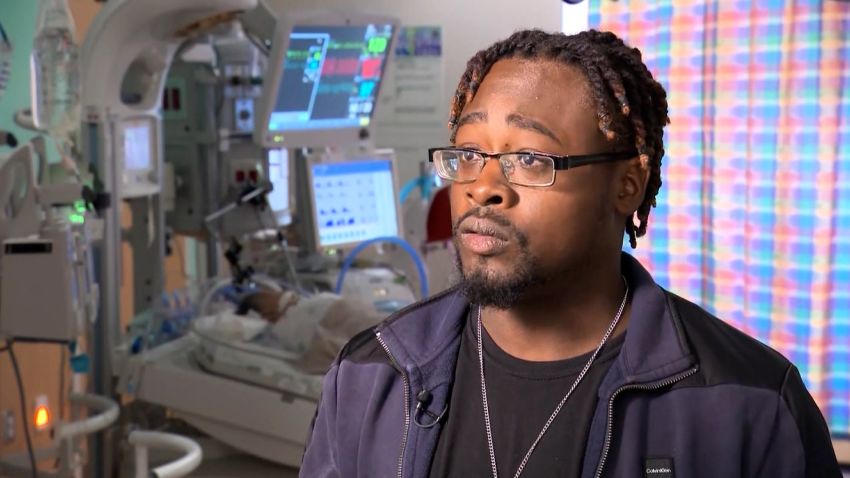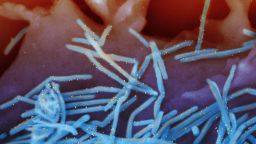Pfizer says it has enough promising data on its respiratory syncytial virus, or RSV, vaccine designed to protect newborns that it will end enrollment in the study and submit for US Food and Drug Administration approval by the end of the year.
RSV is a common respiratory virus that typically causes mild, cold-like symptoms, but it can cause serious illness, particularly in older adults and infants. Pfizer’s vaccine candidate is administered to pregnant women who then make antibodies that cross the placenta and protect the baby after birth.
“The [study data monitoring committee] recommended, based on the data that we have, that we should go ahead and file, that this offers the potential for a safe and effective vaccine that could really dramatically help to prevent RSV during the winter season,” Dr. William Gruber, Pfizer’s senior vice president of vaccine clinical research and development, told CNN.
In the trial, the vaccine was given to pregnant people and appeared to be about 80% effective at preventing severe RSV disease in their infants in the first three months of life. It also cut a baby’s risk of needing to see a doctor for an RSV infection by half.
Potential for first new product in decades
If approved, Pfizer’s inoculation will be the first against RSV and the first new product related to the infection in over two decades.
In March, the FDA designated Pfizer’s RSV vaccine a breakthrough therapy, a status that speeds its review.
“That puts us in a very good position to essentially have something well in advance of next winter,” Gruber said, noting that both Pfizer and the FDA are conscious of the ongoing heavy RSV season in the US.
“It will be up to them whether or not they can think of any other path that could allow this to come sooner,” he said.
Pfizer’s vaccine contains the virus’ F-protein, the site that it uses to attach to human cells. The protein is frozen into the shape it folds into before it fuses with a cell, so the immune system can build antibodies against it. Pfizer’s RSV vaccine is bivalent, containing F-proteins from both the A and B subgroups of the RSV virus, which are the two most commonly circulating strains.
In a study of 7,400 pregnant people and infants, the vaccine was 82% effective at preventing severe lower respiratory tract infections in hospitalized babies for the first three months of life. It was about 70% effective at preventing severe RSV in hospitalized infants for six months.
Babies were considered to have severe RSV if they were breathing very rapidly, over 70 breaths per minute in a 2-month-old; if their blood oxygen levels fell below 93%; if they required high-flow oxygen, or if they were admitted to the ICU; or if they lost consciousness.
The vaccine cut the need for infants to need to see a doctor because of RSV by an average of more than 50% compared with a placebo. That result did not fall within a statistical range that was specified by the FDA before the outset of the trial, however, so the company acknowledges that the vaccine missed that particular goalpost.
Gruber points out, however, that a 50% reduction in doctor visits due to RSV is still likely to be a noticeable and important benefit in the real world.
“This is clearly sufficient and frankly, great news, for filing for our approval,” he said.
Pfizer also recently announced positive results in an ongoing trial of the same vaccine in older adults.
Longer-term research
The drugmaker’s FDA filing would make it the first in a crowded field of companies developing vaccines against RSV. GSK had been testing a maternal vaccine but paused its study after learning of a safety problem.
GSK said Monday that the trial remains stopped, though it did not share any details on the safety issue.
“Further analysis to better understand safety data from these trials is ongoing,” spokesperson Alison Hunt said in a statement to CNN. “The relevant regulatory authorities and trial investigators have been informed. We’re committed to transparently sharing more data as we have it.”
No safety issues have been identified with Pfizer’s vaccine, Gruber said, and a panel of independent reviewers that looks over the study findings while the trial is progressing found no problems.
“The vaccine is very tolerable, and no safety signals were identified,” he said, though the full results of the trial have not been published.
Although Pfizer will suspend enrollment in the maternal vaccination trial, Gruber says it will continue to follow the infants who are enrolled.
Get CNN Health's weekly newsletter
Sign up here to get The Results Are In with Dr. Sanjay Gupta every Tuesday from the CNN Health team.
“We know that children that have RSV end up having compromised lung status, and they become more susceptible, in many instances, to other respiratory infections that puts them back in the hospital. So we’re very interested in determining does this not only have a specific effect as the vaccine was intended to have against protection against RSV, but it may have a side benefit of allowing these children to fare better over the longer term,” he said.




